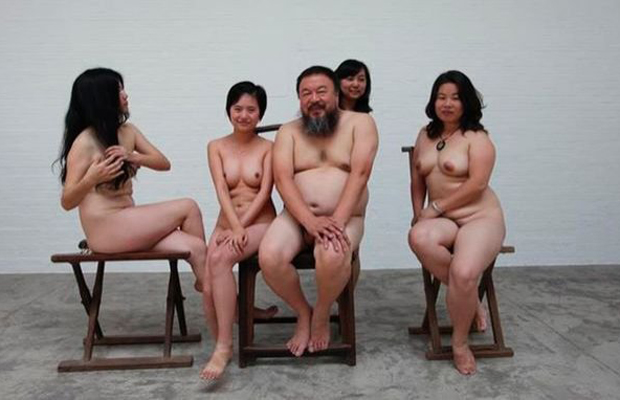
Ai Weiwei hit with porn charge over 2010 photo
Artist tells reporters that authorities are threatening pornography, bigamy and new money exchange charges
Yesterday we reported that Ai Weiwei's lawyer had gone missing. Now, in the latest attack on the Chinese dissident artist he has been told by police that he could face bigamy and pornography charges. Once again, he's been barred him from travel, despite the recent lifting of bail conditions imposed after his detention.
Ai left his house yesterday for the first time in a year without having to report his whereabouts to police. He told witting reporters: "If getting back half of my freedom means I'm free, then I'm a free person. But they're restricting my ability to travel and still trying to fabricate crimes."
These include pornography, bigamy and illicit exchange of foreign currency. Police have told the artist that a 2010 photograph of him (above) pictured with four naked women had been downloaded over 1,000 times and that the artist was effectively spreading pornography. Ai said the four women had posted the photograph "as a joke".
"We never even touched each other," Ai said. "It's nothing. Nobody will say that's pornography. I asked them why this is pornography. They said under our policy, if there's nudity, if people try to open a file many times, like over 1,000 times, that's pornography. They have a law like that, which is ridiculous."
Ai, who is married denies the charge of bigamy. He's made no secret of having a girlfriend with whom he has a three-year-old son. On the possible charge of "illicit exchange of foreign currency", Ai said police told him that it concerned a project in 2008, when he invited foreign architects to Inner Mongolia and arranged for a Swiss gallery to pay them in euros, while he received yuan currency in return.
Ai Weiwei said that when he asked police how long the investigation could take, he was told it could go on for "as long as they want, it could be years".
"I feel this shows that they are trying to intimidate, trying to put pressure on a citizen to tell you who's the authority and still to punish me for doing what I've been doing. I'm still paying a price for that, paying a price for freely communicating and discussing and giving out opinions and criticising different matters," he told Reuteurs.